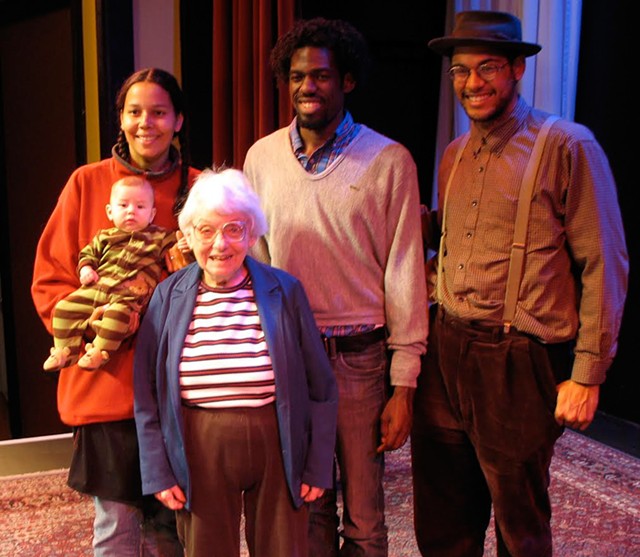
- Dena Epstein with the Carolina Chocolate Drops
In the opening voice-over of The Librarian and the Banjo, banjo legend Béla Fleck says, "The truth of the banjo's history is that it's a really big story; it's a really big American story — as American as they get." That story, however, may not be the one that many Americans expect. So suggests a 2013 documentary that the Fletcher Free Library in Burlington will present on Tuesday, February 9, at a free screening with writer, filmmaker and banjo player Jim Carrier in attendance.
Carrier's film is a love letter not only to an instrument that many regard as quintessentially American, but also to the profoundly radical potential of public libraries. In particular, it's an homage to the perseverance of one librarian who dramatically changed the understanding of African American folk music and American music history: Dena Epstein. Epstein's work contradicted the profoundly whitewashed standard narrative of the banjo's origins, as well as the assumption that people brought to North America as slaves were "culturally naked."
Carrier told Seven Days by phone that he first became interested in the banjo in 1972, after he heard on the radio the "Dueling Banjos" theme from Deliverance, adapted from the 1955 composition by Arthur "Guitar Boogie" Smith. As The Librarian and the Banjo demonstrates, the theme song to director John Boorman's rural horror story helped popularize the instrument. But the movie also perpetuated the myth that the banjo was, as Carrier put it, "an Appalachian hillbilly instrument."
Carrier found his fascination with the history of the banjo sparked while he was researching his book A Traveler's Guide to the Civil Rights Movement. In Virginia, he encountered an oil painting called "The Banjo Lesson" by Henry Ossawa Tanner, which depicts an elderly black man giving a lesson to a little boy in a cabin. It's a far cry from standard associations of the instrument with both white Appalachia and minstrelsy.
"It really blew my mind," said Carrier, "and I began looking around. When you look into banjo history, you don't go very far before you run into Dena Epstein."
Epstein's seminal work Sinful Tunes and Spirituals: Black Folk Music to the Civil War, first published in 1977, was the culmination of nearly three decades of painstaking research. It demonstrated that the banjo evolved from African instruments introduced to North America by individuals brought to the country as slaves. One of the film's subjects refers to the banjo as "an antenna to the ancestors."
"I felt so frustrated talking to little children all day," Epstein says in the film, explaining the impulse behind her initial research. A housewife in New Jersey with a master's in library science, she began to take bus rides to the New York Public Library, where a fortuitous encounter spurred her in the direction of her work in the years to come.
In that pre-internet era, Epstein maintained postal correspondences with other librarians and projected microfilm on the walls of her house. Her success was due in large part to her commitment to unexpected sources. As she puts it, "People who concentrated on music books never found anything."
"It's an enchanting story about how one woman really changed our understanding of American music history," Carrier said of Epstein's work. He met and spoke with her over several visits in 2009. The film features Epstein and a host of scholars and musicians, including Grammy winners Eric Weissberg and the Carolina Chocolate Drops. The documentary premiered at the Wisconsin Film Festival in April 2013. Epstein died in November of that year at age 96.
Last August, Carrier moved to Burlington from Madison, Wis., with his wife, Trish O'Kane, a lecturer at the University of Vermont's Rubenstein School for Environment and Natural Resources. After the screening, Carrier will be joined by Vermont musicians Pete Sutherland and Rick Ceballos. They'll play several types of instruments in the banjo family, demonstrating the versatility of this instrument that reminds us just how vital African American culture has been to America's history.









Comments
Comments are closed.
From 2014-2020, Seven Days allowed readers to comment on all stories posted on our website. While we've appreciated the suggestions and insights, right now Seven Days is prioritizing our core mission — producing high-quality, responsible local journalism — over moderating online debates between readers.
To criticize, correct or praise our reporting, please send us a letter to the editor or send us a tip. We’ll check it out and report the results.
Online comments may return when we have better tech tools for managing them. Thanks for reading.